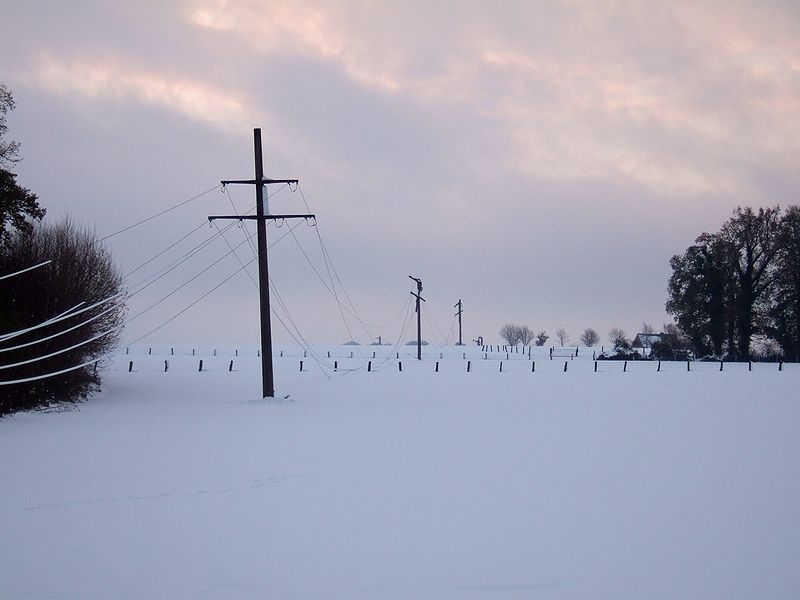.
Most people know more as they get older:
I give all that the cold shoulder.
I spent my second quarter-century
Losing what I had learnt at university
And refusing to take in what had happened since.
Now I know none of the names in the public prints.
And am starting to give offence by forgetting faces
And swearing I've never been in certain places.
It will be worth it, if in the end I manage
To blank out whatever it is that is doing the damage.
Then there will be nothing I know.
My mind will fold into itself, like fields, like snow.

The Winter Palace: Philip Larkin, 1978, from Collected Poems (1988)
Interior of the Winter Palace, Jordan Staircase: Konstantin Andreyevich Ukhtomsky, 1866 (image by Alex Bakharev, 2008)
Collapsed power masts near Ochtrup, Münsterland: photo by Der Sascha, 2005




11 comments:
At the end of every line, a resounding yes ... love the final image, too. Thanks, Tom
Don
Thanks Don,
And I am nodding my assent line-by-line with you. Aye, aye.
Understand that power-lines-down feeling.
Of all the connoisseurs of pessimism and nothingness, including the ones you've included today, I love Larkin the most . . .
(although I note the review of the play about Rothko in the NYT . . .
Like life itself. Where were we before we were here? Where will we go after we leave? Will we remember anything of what we have learned? Why do we have to learn it then?
For a poem to "nothing", it is too loaded with "everything".
=)
a poem to "nothing"... loaded with "everything".
Is not this the kind of poem we are always writing, usually without knowing it?
(But of course we are rarely writing it quite so well as this...)
Pursuant to our exchange on another of your recent posts, Tom, I will observe that this Larkin poem seems--as his poems often do for me--uncharacteristic of him. Yes, the pessimism and humility are present, and the poem's very carefully structured, but somehow I always am always surprised at how immediate he makes his emotions seem.
The snow closing in. Shivers!
Yes Curtis, and I think PL may have felt it was perhaps a bit too direct and immediate for comfort. Certainly a lot is exposed, in not so much a "confessional" as, what would be the word, an existential way?
One can hardly argue with the directness, though one cannot, at the same time, but wince, from the directness.
It is certainly lucid enough.
In any case, he never published it. Nor is it mentioned in any of his letters. It was writ on All Saints Day, 1978.
There is a letter of two days earlier, from Hull, to Harold Pinter. Pinter had done a televised reading of the Larkin poem Aubade, on the BBC, and Larkin was in the difficult position of having to, on the one hand, appear gracious with Pinter in the letter, and admit that he had not watched the programme.
"So I just had to imagine it!"
He had not been able to find a telly, he said.
"Of the three people I know with television sets one had gone to Leeds, one had gone to the ballet, and one was ill. So I just had to imagine it!"
(He went on to say that the programme had also been shown across the Atlantic, and "gone down well in America: some mad bookseller is doing a luxury edition he wants me to sign...")
In any case, he was staying in.
"Must get into training for listening to Test matches at 6 a.m.!"
Curtis and Tom, your thoughts on the Larkin poem put me in mind of Elizabeth Bishop, who too can have a directness, an immediacy, that is at once exposed yet not confessional. I'm thinking of her poem "One Art" but certainly there are others; yet, again, it was somewhat uncharacteristic of her.
Thanks for the cogent thoughts and the reminder of how wonderful a poem this is.
Don
Don,
Interesting issue this: how does a great poet, at a point of achieved formal mastery, deal with the demands of subject matter so pressing that it does not seem to want to be formally contained -- a sense of depression (in Larkin's case) or loss (in Bishop's) that seems to want to "speak itself", sans mediation?
The Bishop poem gains its distance, I think, through the poet's resort to the roundel form.
The Larkin gets its necessary distance, I think, through that somewhat frightening aloofness of tone.
Both extremely memorable poems.
It's relatively easy to be youthful and play around in one's poetry. Later, not so easy, maybe, to write at all -- much less to write so honestly and directly as we have seen these two exceptional poets do.
Many thanks for the example, there is insight and provocation to reflection in your reminder.
Tom - Sorry to be lurking (larking? not exactly, at this hour) about in unexpected corners like this, but I can't not respond to the one poem of Larkin's that really gets to me, and one couplet that has always struck me as miraculous, rhythmically:
It will be worth it, if in the end I manage
To blank out whatever it is that is doing the damage.
That - particularly that exhausted second line - is the sound of an out-of-petrol 1964 Morris Minor stumbling across potholes into a verge in Camberley. Believe me - I have recordings. Unforgiving stuff - and what a great, mysterious title.
Your larking about is my pleasure, Barry. Coming from Stevie Smith's Magna Est Veritas to that stunning couplet of Larkin's, I believe I see a curious commonalty of attitude or disposition. Perhaps it's just that neither of them was ever able to put up with any... I was going to say false optimism, but might just leave it at optimism, period.
Post a Comment